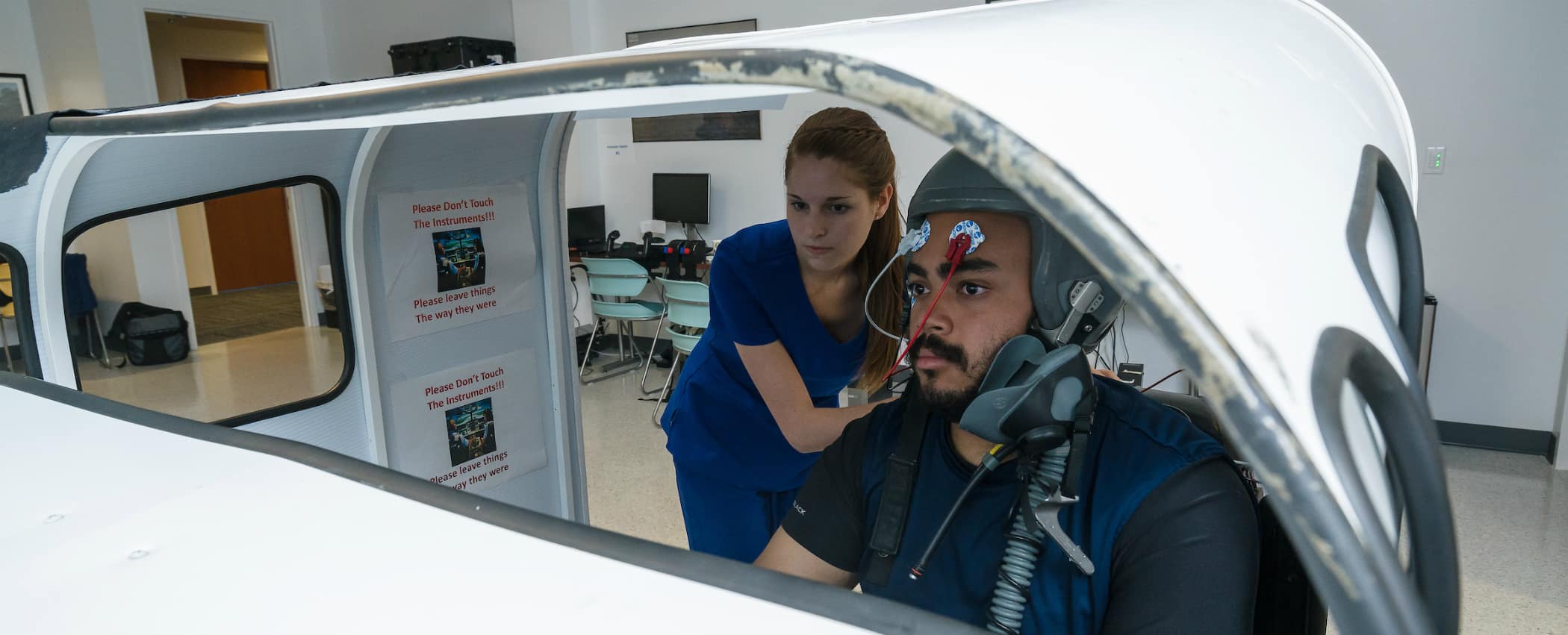
Master of Science in
Human Factors
The Master of Science in Human Factors prepares students to consider human factors concerns during the design and development of systems, products and environments.
About the Master of Science in Human Factors
Embry‑Riddle Aeronautical University’s Human Factors graduate program prepares its students to ensure that human-centered concerns, both psychological and physiological, are given due consideration during the design and development processes of systems, products and work environments. Students will combine learned psychological principles and cognitive engineering fundamentals to maximize the interaction of humans with machines, as well as human performance issues.
The Master of Science in Human Factors offers a distinct focus that educates the student on human cognitive processes, safety and human capabilities and limitations. Students may choose to focus their human factors degree through either a thesis or non-thesis option.
Student Learning Outcomes
What you will learn while pursuing a human factors master's:
- Demonstrate the ability to comprehensively evaluate human psychological and physiological capabilities and limitations
- Apply human factors evidence-based methodologies to industry-based problems and develop strategies to control, mitigate and/or solve them
- Apply the fundamentals of Human Factors and Ergonomic (HF/E) principles and concepts to complex socio-technical systems across multiple HF/E domains
- Demonstrate ethical professional writing, communication and oral presentation skills using appropriate media and industry technology
Human Factors Career Opportunities
Careers and Employers
Human factors master's graduates boast a high 100% placement rate within one year of graduation and are designed for those looking to find work as engineers, researchers, applications experts, industry leaders and organizational managers.
Human Factors degree graduates tend to enter the industry with companies such as:
- The Boeing Company
- Airbus
- Lockheed Martin
- NASA
- Northrop Grumman
Human Factors Salary Information
As of 2022, alumni with a Master of Science in Human Factors tend to receive competitive salaries, with an average income of $111,400 annually.
DETAILS
About Human Factors at the Worldwide & Online Campus
The Master of Science in Human Factors is an online program designed for post-bachelor students who want to advance their learning in the principles of human factors, human capabilities and human limitations. The degree is focused on a wide variety of industry concerns, such as human performance, system design, interface design, VR and simulation, ergonomics and safety.
Offered completely online, the human factors degree allows students to network with fellow professionals from around the world, as well as with highly skilled faculty members with decades of practical experience.
Professional Accreditation
The Human Factors program is recognized by the Royal Aeronautical Society (RAeS).
Human Factors Information
- Credits: 30 Credits for Culminating Research Experience or 33 Credits for Thesis
- Online or In-Person: Fully online
- Thesis: Thesis or Culminating Research Experience (CRE) Option
Helpful Links
- Attend a Worldwide Virtual Info Session
- Discover the Department's Faculty
- Explore the Fields of Study: Engineering & Applied Science
- Find Related Clubs & Organizations
Royal Aeronautical Society
The Master of Science in Human Factors program is recognized by the Royal Aeronautical Society (RAeS).
Student Learning Outcomes
Students will:
- Apply human factors evidence-based methodologies to identify, interpret, and define industry-based problems and develop strategies to control mitigate and/or solve them.
- Apply the fundamentals of human factors and ergonomic principles and concepts to complex socio-technical systems.
- Comprehensively evaluate human physiological capabilities and limitations across multiple human factors and ergonomics domains.
- Demonstrate ethical professional writing, communication and oral presentation skills using appropriate media and industry technology.
- Evaluate human cognitive/psychological capabilities and limitations comprehensively across multiple human factors and ergonomics domains.
DEGREE REQUIREMENTS
Major/Core
| MSHF 606 | Human Cognition | 3 |
| MSHF 612 | Human Performance, Limitation, and Error | 3 |
| MSHF 618 | Human Factors in Virtual and Simulated Environments | 3 |
| MSHF 624 | Ergonomics and Biomechanics | 3 |
| MSHF 640 | Human Physiology and Adaptation | 3 |
| MSHF 641 | Systems Psychology | 3 |
| MSHF 647 | Human Factors in Complex Systems | 3 |
| Total Credits | 21 | |
Research Options:
Culminating Research Experience (CRE)
| RSCH 650 | Research Methods and Analysis | 3 |
| MSHF 653 | Cognitive Systems Engineering | 3 |
| MSHF 691 | MSHF Culminating Research Experience | 3 |
| Total Credits | 9 | |
Thesis
| RSCH 665 | Statistical Analysis | 3 |
| RSCH 670 | Research Methods | 3 |
| MSHF 700A | MSHF Thesis I | 3 |
| MSHF 700B | MSHF Thesis II | 3 |
| Total Credits | 12 | |
| Total Degree Requirements | ||
| Culminating Research Experience (CRE) | 30 | |
| Thesis | 33 | |
Plan of Study (MSHF) - Culminating Research Experience (CRE) Option
Recommended plan of study and sequence of courses for a two-year degree completion scenario. A two-year degree plan or a particular starting term are not required but serve as an example.
Recommended Plan of Study for a Two-Year Degree Completion Scenario (One Course/Term)
Year 1
| Term 1 | Credits | |
|---|---|---|
| MSHF 606 | Human Cognition | 3 |
| Credits Subtotal | 3.0 | |
| Term 2 | ||
| MSHF 612 | Human Performance, Limitation, and Error | 3 |
| Credits Subtotal | 3.0 | |
| Term 3 | ||
| MSHF 640 | Human Physiology and Adaptation ** | 3 |
| Credits Subtotal | 3.0 | |
| Term 4 | ||
| MSHF 618 | Human Factors in Virtual and Simulated Environments ** | 3 |
| Credits Subtotal | 3.0 | |
| Term 5 | ||
| RSCH 650 | Research Methods and Analysis *** | 3 |
| Credits Subtotal | 3.0 | |
| Credits Total: | 15.0 | |
Year 2
| Term 1 | Credits | |
|---|---|---|
| MSHF 624 | Ergonomics and Biomechanics **** | 3 |
| Credits Subtotal | 3.0 | |
| Term 2 | ||
| MSHF 641 | Systems Psychology ** | 3 |
| Credits Subtotal | 3.0 | |
| Term 3 | ||
| MSHF 647 | Human Factors in Complex Systems ** | 3 |
| Credits Subtotal | 3.0 | |
| Term 4 | ||
| MSHF 653 | Cognitive Systems Engineering ** | 3 |
| Credits Subtotal | 3.0 | |
| Term 5 | ||
| MSHF 691 | MSHF Culminating Research Experience * | 3 |
| Credits Subtotal | 3.0 | |
| Credits Total: | 15.0 | |
| Total Degree Requirements | 30 | |
Recommended Plan of Study for a Two-Year Degree Completion Scenario (Two Courses/Term)
Year 1
| Term 1 | Credits | |
|---|---|---|
| MSHF 606 | Human Cognition | 3 |
| RSCH 650 | Research Methods and Analysis *** | 3 |
| Credits Subtotal | 6.0 | |
| Term 2 | ||
| MSHF 612 | Human Performance, Limitation, and Error | 3 |
| MSHF 624 | Ergonomics and Biomechanics **** | 3 |
| Credits Subtotal | 6.0 | |
| Term 3 | ||
| MSHF 618 | Human Factors in Virtual and Simulated Environments ** | 3 |
| MSHF 640 | Human Physiology and Adaptation ** | 3 |
| Credits Subtotal | 6.0 | |
| Term 4 | ||
| MSHF 641 | Systems Psychology ** | 3 |
| MSHF 647 | Human Factors in Complex Systems ** | 3 |
| Credits Subtotal | 6.0 | |
| Term 5 | ||
| MSHF 653 | Cognitive Systems Engineering ** | 3 |
| Credits Subtotal | 3.0 | |
| Credits Total: | 27.0 | |
Year 2
| Term 1 | Credits | |
|---|---|---|
| MSHF 691 | MSHF Culminating Research Experience * | 3 |
| Credits Subtotal | 3.0 | |
| Credits Total: | 3.0 | |
| Total Degree Requirements | 30 | |
* Must be taken as the last course
**May be taken in any order after MSHF 606 and MSHF 612 are complete and prior to MSHF 691 or MSHF 700A and MSHF 700B
***May be taken in any order prior to MSHF 691 or MSHF 700A and MSHF 700B
****May be taken consecutively with MSHF 612
Plan of Study (MSHF) - Thesis Option
Recommended plan of study and sequence of courses for a two-year degree completion scenario. A two-year degree plan or a particular starting term are not required but serve as an example.
Recommended Plan of Study for a Two-Year Degree Completion Scenario (One Course/Term)
Year 1
| Term 1 | Credits | |
|---|---|---|
| MSHF 606 | Human Cognition | 3 |
| Credits Subtotal | 3.0 | |
| Term 2 | ||
| MSHF 612 | Human Performance, Limitation, and Error | 3 |
| Credits Subtotal | 3.0 | |
| Term 3 | ||
| MSHF 640 | Human Physiology and Adaptation ** | 3 |
| Credits Subtotal | 3.0 | |
| Term 4 | ||
| MSHF 618 | Human Factors in Virtual and Simulated Environments ** | 3 |
| Credits Subtotal | 3.0 | |
| Term 5 | ||
| RSCH 665 | Statistical Analysis *** | 3 |
| Credits Subtotal | 3.0 | |
| Credits Total: | 15.0 | |
Year 2
| Term 1 | Credits | |
|---|---|---|
| MSHF 624 | Ergonomics and Biomechanics **** | 3 |
| Credits Subtotal | 3.0 | |
| Term 2 | ||
| RSCH 670 | Research Methods *** | 3 |
| Credits Subtotal | 3.0 | |
| Term 3 | ||
| MSHF 641 | Systems Psychology ** | 3 |
| Credits Subtotal | 3.0 | |
| Term 4 | ||
| MSHF 647 | Human Factors in Complex Systems ** | 3 |
| Credits Subtotal | 3.0 | |
| Term 5 | ||
| MSHF 700A | MSHF Thesis I | 3 |
| Credits Subtotal | 3.0 | |
| Credits Total: | 15.0 | |
Year 3
| Term 1 | Credits | |
|---|---|---|
| MSHF 700B | MSHF Thesis II * | 3 |
| Credits Subtotal | 3.0 | |
| Credits Total: | 3.0 | |
| Total Degree Requirements | 33 | |
Recommended Plan of Study for a Two-Year Degree Completion Scenario (Two Courses/Term)
Year 1
| Term 1 | Credits | |
|---|---|---|
| MSHF 606 | Human Cognition | 3 |
| RSCH 665 | Statistical Analysis *** | 3 |
| Credits Subtotal | 6.0 | |
| Term 2 | ||
| MSHF 612 | Human Performance, Limitation, and Error | 3 |
| RSCH 670 | Research Methods **** | 3 |
| Credits Subtotal | 6.0 | |
| Term 3 | ||
| MSHF 618 | Human Factors in Virtual and Simulated Environments ** | 3 |
| MSHF 624 | Ergonomics and Biomechanics **** | 3 |
| Credits Subtotal | 6.0 | |
| Term 4 | ||
| MSHF 640 | Human Physiology and Adaptation ** | 3 |
| MSHF 641 | Systems Psychology ** | 3 |
| Credits Subtotal | 6.0 | |
| Term 5 | ||
| MSHF 647 | Human Factors in Complex Systems ** | 3 |
| Credits Subtotal | 3.0 | |
| Credits Total: | 27.0 | |
Year 2
| Term 1 | Credits | |
|---|---|---|
| MSHF 700A | MSHF Thesis I | 3 |
| Credits Subtotal | 3.0 | |
| Term 2 | ||
| MSHF 700B | MSHF Thesis II * | 3 |
| Credits Subtotal | 3.0 | |
| Credits Total: | 6.0 | |
| Total Degree Requirements | 33 | |
* Must be taken as the last course
**May be taken in any order after MSHF 606 and MSHF 612 are complete and prior to MSHF 691 or MSHF 700A and MSHF 700B
***May be taken in any order prior to MSHF 691 or MSHF 700A and MSHF 700B
****May be taken consecutively with MSHF 612
Get Started Now:
Summary
30 Credits for Culminating Research Experience or 33 Credits for Thesis Credits
Estimate your tuition by using the Tuition Calculator
View Financial Aid Information
Learn more about the benefits of an Online Degree
Learn about our General Education
Find out about transferring credits to this degree
Learn more about our Veterans & Military benefits
View our Academic Calendar
Search Courses for this degree



